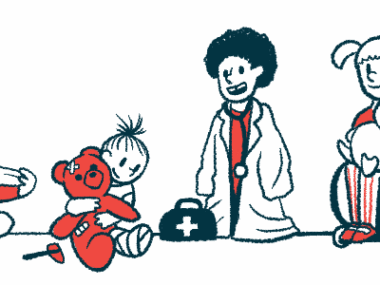How parenting and caregiving have changed since we began
Parents today seem to share more of the caregiving responsibilities
Written by |

It has been 37 years since our son, Robert, was born with Prader-Willi syndrome. During his time in the neonatal intensive care unit, my husband, Carey, was a devoted father. He organized care for our 6-year-old daughter, visited the hospital regularly, and supported me following a difficult birth.
It was a stressful time, and Carey struggled to remain calm while in the hospital. With the focus primarily on our baby, neither of us received much support. Without an immediate diagnosis, we held on to hope that our baby would recover from the symptoms he exhibited at birth.
Babies with Prader-Willi syndrome often have low muscle tone and may require tube feeding after birth. While several other issues may also occur, these are the most noticeable.
How things have changed
My husband and I have very different personalities. I am a natural caregiver determined to “fix” any problems our son faces. In contrast, Carey tends to have a “glass-half-empty” outlook, often imagining worst-case scenarios. My optimistic attitude is what kept me moving forward. (For those wondering, Carey has given me his blessings to describe our relationship in this column.)
Throughout the 1980s, we had a traditional marriage, and my tech-savvy husband earned most of our income. I provided day care for our children and assisted with country club banquets, which gave me the flexibility to attend numerous doctor appointments. My mom accompanied me to several appointments, offering comforting words, such as, “You’ll get through this.” That helped me cope.
My husband and I had prayed for our son’s symptoms to somehow disappear, but unfortunately, that never happened. At home, my husband often catastrophized the information I shared with him about our son, leading me to become guarded about what I revealed.
I noticed that many marriages among close friends during that era had similar dynamics. In these families, mothers often took on the majority of caregiving tasks, food preparation, and household cleaning responsibilities. While some mothers held part-time jobs, they were still primarily responsible for taking the children to doctor and dental appointments, and fathers occasionally took them to sporting events.
Fast-forward to today, and a significant shift has occurred. More women have obtained degrees and postponed having children. They work full time and expect their husbands to share the responsibilities of cooking, cleaning, and child care.
When I attend events for people with Prader-Willi syndrome and their families, I see fathers actively participating, which is encouraging. But I sometimes wonder if they struggle to share their feelings and fears. Perhaps they may believe that they are expected to be the strong ones who hold the family together. My husband certainly had expectations about what fatherhood should look like, and he eventually had to adjust that outlook.
A popular book at the time when we were young parents was “Men Are from Mars, Women Are from Venus” by John Gray, which addressed the different ways men and women process their feelings. The author suggested that men are motivated when they feel needed, while women are motivated when they feel cherished. The world has undergone significant changes since then. But I think at least one parent might have to sacrifice their career for caregiving. The number of doctor appointments alone can be overwhelming, compounded by school meetings, physical therapy, and behavioral management. All of that amounts to more than a part-time job.
With increasing awareness among couples and the rise of co-parenting, I think caregiving has become more balanced since we began. I have seen many mothers effectively manage this for years, and I have faith that more fathers can do a stellar job at this as well.
Note: Prader-Willi Syndrome News is strictly a news and information website about the disease. It does not provide medical advice, diagnosis, or treatment. This content is not intended to be a substitute for professional medical advice, diagnosis, or treatment. Always seek the advice of your physician or other qualified health provider with any questions you may have regarding a medical condition. Never disregard professional medical advice or delay in seeking it because of something you have read on this website. The opinions expressed in this column are not those of Prader-Willi Syndrome News or its parent company, Bionews, and are intended to spark discussion about issues pertaining to Prader-Willi syndrome.






Leave a comment
Fill in the required fields to post. Your email address will not be published.